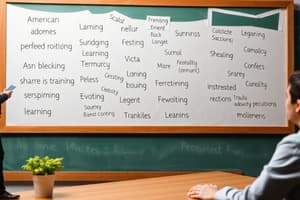Podcast
Questions and Answers
What are some examples of the unique American words found in Lewis and Clark's journals?
What are some examples of the unique American words found in Lewis and Clark's journals?
Some examples include 'creek,' 'rapids,' 'bluff,' 'rattlesnake,' and 'elk.'
How did the Great Rivers contribute to the further exploration and settlement of America?
How did the Great Rivers contribute to the further exploration and settlement of America?
The Great Rivers became America's superhighways after Lewis and Clark's expedition, allowing for further exploration and settlement.
What were some linguistic contributions of the Irish settlers to American English?
What were some linguistic contributions of the Irish settlers to American English?
Irish settlers contributed the use of 'dead,' as in 'dead straight,' and the similar use of 'plumb' and 'right.'
What was the impact of the French influence on American English?
What was the impact of the French influence on American English?
What is the significance of the term 'immigrant' in the context of American English?
What is the significance of the term 'immigrant' in the context of American English?
Who played a crucial role in helping the Pilgrims survive their first year in America?
Who played a crucial role in helping the Pilgrims survive their first year in America?
When did English arrive in America?
When did English arrive in America?
What became influential in standardizing American English and promoting proper spelling and pronunciation?
What became influential in standardizing American English and promoting proper spelling and pronunciation?
What event led to the establishment of the United States?
What event led to the establishment of the United States?
Why did English borrow few words from native languages in America?
Why did English borrow few words from native languages in America?
Study Notes
- The text discusses the story of how English became a global language, starting from its beginnings in Britain and its journey to various parts of the world.
- English arrived in America with the Pilgrims in 1620, who established Plymouth Plantation and faced challenges in the new environment.
- Savage, a Native American who spoke English, played a crucial role in helping the Pilgrims survive their first year in America.
- English borrowed few words from native languages despite the richness of an entire continent due to the settlers' desire to recreate the English shires.
- English spread in America through persistent settlement and the teaching of proper English, which set the pattern for future generations.
- Rival European powers tried to influence the language in America, but English prevailed due to its persistence and weight of numbers.
- American English started to develop its own character, with some differences in pronunciation and spelling compared to English in England.
- Tensions grew between the colonists and the English crown, leading to the American Revolution in 1775 and the establishment of the United States.
- Noah Webster's American Spelling Book became influential in standardizing American English and promoting proper spelling and pronunciation.
- Webster's book also reflected American values of democracy and equal opportunity, which were different from the aristocratic English values.
- America continued to claim its future in English by preserving the language in all its past glories while allowing natural developments.
- America's expansion westward led to the adoption of new words and pronunciations, making American English distinct from English in England.
- The United States purchased Louisiana in 1804, doubling its size and leading to the exploration of the unknown interior by Lewis and Clark.
- Lewis and Clark's expedition was one of the epic journeys in American history, opening up new territories and expanding American English.- Louis' expedition at the junction of the Mississippi and Missouri rivers marked the beginning of the decline of East Coast grip on American English.
- Lewis and Clark were army-trained frontiersmen who kept daily journals in a practical frontier language.
- Journal entries included unique American words like "creek," "rapids," "bluff," "rattlesnake," and "elk."
- The journals contained over 2,000 new English words, mostly names of new flora, fauna, and man-made items.
- Examples of new words included "hickory," "hominy," "maize," "moccasin," "moose," "opossum," "pecan," "persimmon," "toboggan," and "sapsucker."
- Some words were derived from native languages, while others were English words with descriptive properties like "whippoorwill" and "mockingbird."
- Other words were combinations of existing English words like "black bear," "bluegrass," "bottomland," "backtrack," "box elder," "brown thrush," "Buckeye," "buzzard," and "Yellow Jacket."
- The Great Rivers became America's superhighways after this expedition, allowing for further exploration and settlement.- Louis, now known as St. Louis, was a major hub for immigrants in the 1830s and 1840s, marking the beginning of the frontier in the US.
- The term "immigrant" was invented in America, as vast migrations of people were a defining experience of the new nation.
- New settlers brought new linguistic energies, with many coming from Scotland and Ireland.
- Scots introduced the verb "scoon," meaning to skim over water, leading to the invention of schooners.
- Irish settlers contributed "dead" as in "dead straight," and the similar use of "plumb" and "right."
- The French influence is apparent in place names, such as New Orleans, Baton Rouge, and Lafayette.
- The French term "hotel" was turned into a new invention, a palace for all people.
- The word "businessman" took on its modern American meaning, denoting a mover and shaker in finance and expansion.
- The Mississippi River teemed with poor migrants, known as "rednecks," who traveled on rafts and were called "riffraff."
- Gambling and drinking spread across the West, adding to the rich vocabulary of the American language.
- Benjamin Franklin listed over 200 words and phrases minted in America.
- The Irish settlers contributed the term "speakeasy," among others.
- Westward expansion led to conflicts with natives, resulting in the adoption of their words and phrases, such as "no-can-do" and "long time no see."
- The arrival of railroads opened up the country and gave rise to the cowboy industry and culture.
- Buffalo Bill's Wild West show popularized the myth of the American West and featured real Indians, elk, and buffalo.
- Slaves arriving at Sullivan's Island in Charleston Harbor spoke a distinct variety of English called Gullah, influenced by African languages and Elizabethan English.
- Gullah employs some grammatical features that differ from standard English, such as the use of "done" to indicate past tense.
- The Bible became a symbol of freedom for slaves, who introduced new words and sounds into the language and sang about their hope of escaping to the north and to freedom.
- The Civil War gave the country the phrase "hold the fort," while the Ku Klux Klan introduced the term "bulldozer," a reminder of segregation and prejudice that persisted after the war.
- Mark Twain, a native of the Mississippi River region, captured the dialects of the river in his famous novel, "The Adventures of Huckleberry Finn."
- The library committee in Concord attempted to ban Twain's book for its vernacular language, but the vigor of American English continued to grow and evolve.
- The late 19th century saw an influx of new immigrants from Europe, who contributed to the expansion of the American language.
Studying That Suits You
Use AI to generate personalized quizzes and flashcards to suit your learning preferences.
Description
Explore the journey of English from its arrival in America with the Pilgrims, its influence on the American Revolution, the expansion westward, and the contributions of various immigrant groups to the evolution of American English. Discover how Lewis and Clark's expedition, the influence of French and Irish settlers, the impact of westward expansion, and the experiences of slaves all shaped the development of American English.




